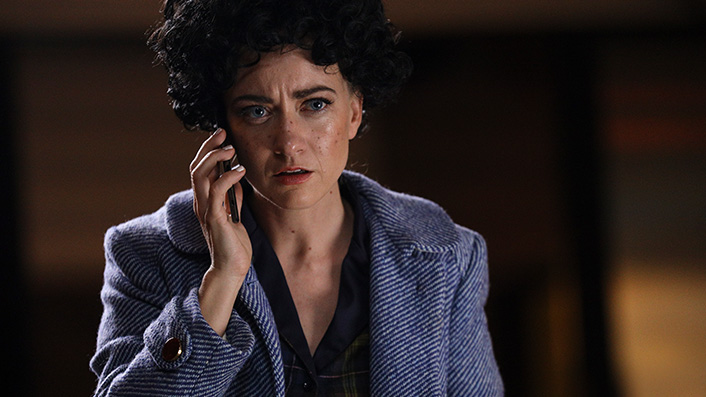Search Party switches gears with its deeply psychological fourth season
This one could earn Alia Shawkat an Emmy nomination.

The fourth season of HBO’s Search Party, now streaming on Neon, continues the show’s addictive blend of crime mystery and Millenial mockery. Liam Maguren details the show’s uniquely twisting plot throughout the seasons and the evolving excellence of its prime star Alia Shawkat.
I previously compared Search Party‘s addictiveness to Breaking Bad, Parks and Recreation, and a tube of Pringles. An odd trio, to be sure, but I think they label this hugely entertaining black comedy quite well, and with a new season upon us, I’m tempted to add Hannibal to the mix. Or Stephen King’s Misery. I’m undecided.
See also:
* Films and shows now streaming on Neon
* Everything new to coming to Neon
It all started so simply with dissatisfied Millenial Dory (Aila Shawkat) attempting to find both an old college acquaintance who’s gone missing and direction in her seemingly aimless life. She definitely got at least one of these things by the end of the first season—but in a ‘be careful what you wish for’ sort of way.
With each finale, the creators pushed Dory and her fellow self-absorbed sleuths into distinctively different subgenres. Season one delivered a missing person mystery. Season two ramped things up as an on-the-run thriller. Season three switched gears by satirising courtroom dramas. Now we have season four, which is undoubtedly a psychological horror.

That might sound like a back-breaking tonal whiplash, but like its previous genre-bends, Search Party proves to be quite the contortionist. It helps that the show keeps one foot anchored in its painfully observant mockery of the ‘me generation’; consistent comedy has a way of making tone shifts and plot absurdities easier to ride with. Even more helpful, the jokes continue to be piercingly funny.
Season four starts by dumping Dory’s friends in comically bizarre prisons of their own making. Elliott (John Early) trades his morals for money by becoming a gay news anchor championing a right-wing station’s anti-gay values; Portia (Meredith Hagner) finds herself performing in the Lifetime movie adaptation of the events from season one; and straight-laced Drew (John Reynolds) goes incognito as a mascot at a discount Disneyland. They are all living outside the binary world of fantasy and reality which, for a generation brought up on Instagram and other duplicitous forms of online media, feels fittingly farcical.

Here lies Search Party‘s most devilish and cunning trick: the ability to chainsaw-juggle facts with fiction. Season four leans into this harder than ever with Dory’s predicament and you should stop reading here if you don’t want any season 1 – 3 spoilers because her stupendous character arc deserves going into detail.
Ever since Chantal’s disappearance, Dory’s been in a state of delusion. Suddenly, her seemingly dull life was (very, very vaguely) connected to an intriguing and exciting tragedy. Fuelled by self-confidence, she blew up the missing person mystery to something more than it ended up being—the actions of a selfish brat.
Too bad creepy investigator and loving father Keith had to die for it. Though the killing was accidental and sort-of in self-defence, the messy act was nevertheless powered by the false assumption that he was a villain. Certain their innocence won’t be believed, Dory finds justification in hiding Keith’s body. Her delusion? Believing life will return to normal after causing someone’s death. To no-one’s surprise, it doesn’t.

Reality hits hard when they’re all arrested, though Dory’s convictions cannot be thwarted. She doesn’t just believe they’re all innocent, she emphasises that they’ve “done nothing wrong,” though those aren’t necessarily the same thing. Regardless, she stands her ground to a frighteningly assured degree—an all-in delusion that rewards her with a ‘not guilty’ verdict but leaves the viewer disturbingly unsure of Search Party‘s central character.
It’s a brilliant, gradual acting descent into the No Man’s Land of delusion for Shawkat—the kind of long-gestating role actors dream of. Much like how Game of Thrones would ping-pong the likeability of its key characters, Search Party challenges the viewer’s attachment to Dory. At one moment, she’s a sympathetic victim. At another, she’s a self-interested manipulator. With the enthusiasm of a cat with a dead mouse, Shawkat batters your sense of loyalty with bright-eyed enthusiasm, sudden shifts in tone, and the odd psychotic cocking of the head for good measure.
Season four changes all that. Dory now faces an unblinking kidnapper Chip (Cole Escola) and his own delusions—that they’re BFFs—caging her in a Michel Gondry nightmare version of her flat where everything’s made of soft and fuzzy material. This is Dory’s prison of her own making: her deceptions have manifested into a #1 fan intent on holding her captive out of love (hence, the Misery reference).

Shawkat commits to the anguish of her character’s desperate situation, once again playing with our sympathies in a manner most cruel and compelling. Her only chance of escape is to play along with Chip’s fantasy of friendship and find an opening. However, Chip has a sketchy background in psychology (hence, the Hannibal reference), and as things take a more surreal turn, so do the tables.
This creates an unprecedented amount of space for Shawkat to burrow further into the muddy ground between fantasy and reality—both of which are fighting against each other inside her head. Does she submerge herself into the falsehoods of a madman or hold onto the guilt-ridden truth? What emerges is a surprisingly sophisticated exploration of psychological pain that remains comedic enough to avoid weepy bleakness. The portrayal’s nothing without Shawkat’s excellent control of Dory’s difficult nature, so don’t be surprised if season four earns her a much-deserved Emmy nomination.
It does beg the question though: how much further can this complex character go before she falls off the tightrope? No matter the answer, it’s an enthralling act to watch.






















